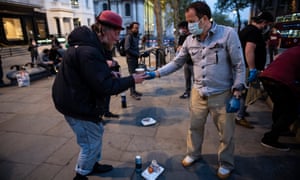On the eve of Mental Health Awareness week, one eminent psychologist reminds us that those resistant to empathy need it most
“Be
kind” has been a recurring message in 2020. Our gratitude to the key
workers at the front line of the pandemic shows how much we value
kindness. Yet kindness is not always easy to sustain, and as a society
we seem to struggle to be kind to certain groups.
Thinking seriously about why this might be can help us to understand both the nature of psychological distress and our difficulties with reaching out to those in need.
Kindness is more than mere sentiment. Real kindness and concern require us to understand how the other person came to think and feel the way they do, no matter how alien or difficult that might seem to us.
Our capacity to see both our own and others’ point of view is the
essence of our humanity, which from an evolutionary point of view has
enabled our planetary ascendance. Our species’ dominance is the result
of our capacity to collaborate, which allows us to transmit and develop
complex ideas.Thinking seriously about why this might be can help us to understand both the nature of psychological distress and our difficulties with reaching out to those in need.
Kindness is more than mere sentiment. Real kindness and concern require us to understand how the other person came to think and feel the way they do, no matter how alien or difficult that might seem to us.
Successful collaboration requires us to tune in to the social cues that tell us whether the people we meet are trustworthy. While collaboration is essential, so is vigilance, because not everyone is trustworthy. But when vigilance dominates, we close our minds.
Teachers who show consistent awareness of their students’ concerns are the most likely to succeed in getting them to learn. The teacher I remember best presented each of us with a book at the end of each term that she chose as best suited to our character. I could never quite figure out why she chose the books she gave to me, but I remember her lessons, along with the kindness her action conveyed.
"Stigma is the cruellest of social forces because it works in two directions"
Tragically, those whose experiences have left them least able to trust – people with mental health issues, drug problems, homeless people and yes, sometimes people from other cultures and ethnic groups – are often excluded from this human chain. Those of us who have not experienced the challenges they have faced can find their suspicions hard to understand, and we struggle to be kind to them. We regard them as problematic and threatening. They are “alien”, “unengaged” and “hard to reach”.
Stigma is the cruellest of social forces because it works in two directions. While we may want to be kind and show concern, if we can’t understand the other person’s concerns then our good intentions will not penetrate their defensive barriers. A traumatised child feels obliged to remain hyper-vigilant just to survive. The result is often a vicious circle of social disengagement, distrust and withdrawal: our tolerance of their needs and the challenges they present is limited, and we withdraw kindness when it is needed most. This is the challenge we face when thinking about mental health and social inclusion.
Study after study shows that children who have been maltreated struggle in school, even when surrounded by well-meaning adults striving to show “kindness”. Their capacity to trust is so damaged that learning becomes almost impossible. Often these children are stigmatised as “troublemakers”. But it is not motivation that they lack. It is the kindness that springs from genuinely understanding their perspective.
Tomorrow is the start of Mental Health Awareness week. Its theme this year is kindness. It’s important because our ability to think about other people’s minds has enabled us to create a shared social world in which we can think together, trust and cooperate. The pandemic has reminded us that only by thinking together can we hope to survive and flourish, and that excessive vigilance breeds lack of concern, unkindness and social irresponsibility. We need to apply these lessons more widely, both for our collective mental health and to help the most vulnerable and isolated.
Professor Peter Fonagy is chief executive of the Anna Freud Centre and Head of the Division of Psychology and Language Sciences at UCL

No comments:
Post a Comment